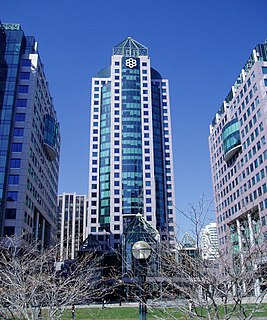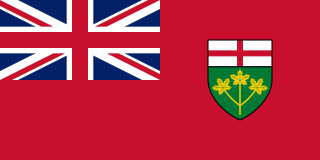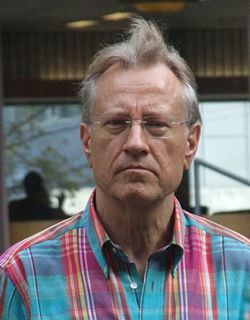Alan Tonks is a former Canadian politician. He was the Liberal MP for the federal riding of York South—Weston in Toronto from 2000 to 2011, and was the final Metro Toronto Chairman before the amalgamation of Metro Toronto into the new City of Toronto.

The Toronto municipal election of 2000, dubbed "Toronto Vote 2000" was the municipal and school board election held in the City of Toronto, Ontario, Canada on November 13, 2000.
Anthony Perruzza is a politician in Toronto, Ontario, Canada. He was a city councillor in North York from 1988 to 1990, and served in the Legislative Assembly of Ontario from 1990 to 1995 as a member of the New Democratic Party. He is now a Toronto City Councillor for the city's eighth ward, in the eastern section of York West.

The 1997 Toronto municipal election was the first election held for offices in the amalgamated "megacity" of Toronto, Ontario, Canada. The elections were administered by the old City of Toronto and its five suburbs within Metropolitan Toronto. The vote was held November 10, 1997, electing the mayor and 56 councillors in 28 wards who took office on January 1, 1998, the day of the amalgamation.
The 1994 Toronto municipal election was held in November 1994 to elect councillors in Metropolitan Toronto, Ontario, Canada, and mayors, councillors and school trustees in Toronto, York, East York, North York, Scarborough and Etobicoke.
The 1991 Toronto municipal election was held on November 12, 1991 to elect councillors in Metropolitan Toronto, Ontario, Canada, and mayors, councillors and school trustees in Toronto, York, East York, North York, Scarborough and Etobicoke.
The Toronto municipal election of 1978 held on Monday, November 13, 1978, was the first seriously contested mayoralty race in Toronto, Ontario, Canada, since David Crombie took office in the 1972 election. Crombie left municipal politics earlier in 1978 to seek and win a seat in the House of Commons of Canada as the Progressive Conservative Member of Parliament for Rosedale electoral district.
The 1985 Toronto municipal election was held to elect members of municipal councils, school boards, and hydro commissions in the six municipalities that made up Metropolitan Toronto, Ontario, Canada. The election was held on November 12, 1985.
The Toronto municipal election of 1976 was held on December 6, 1976 in Metropolitan Toronto, Ontario, Canada. Mayors, city councillors and school board trustees were elected in the municipalities of Toronto, York, East York, North York, Etobicoke and Scarborough.
The 1982 Toronto municipal election was held on November 8, 1982, in Metropolitan Toronto, Ontario, Canada. Mayors, controllers, city councillors and school board trustees were elected in the municipalities of Toronto, York, East York, North York, Etobicoke and Scarborough.
The 1980 Toronto municipal election was held on November 10, 1980 in Metropolitan Toronto, Ontario, Canada. Mayors, controllers, city councillors and school board trustees were elected in the municipalities of Toronto, York, East York, North York, Etobicoke and Scarborough.
The 1974 Toronto municipal election was held on December 2, 1974 in Metropolitan Toronto, Ontario, Canada. Mayors, controllers, city councillors and school board trustees were elected in the municipalities of Toronto, York, East York, North York, Etobicoke and Scarborough.
Municipal elections were held in Toronto, Ontario, Canada, on December 1, 1969. Across Metro Toronto there were few surprising results, and city of Toronto incumbent mayor William Dennison was easily re-elected. The one dramatic exception to this was on Toronto city council, where a number of long-standing members lost to young new arrivals who shared a common vision of opposition to the megaprojects that had transformed Toronto throughout the post-war period. While the reform movement candidate for mayor lost, it gained a strong presence on city council. The 1970s reform faction dominated Toronto politics for the next decade.
The 1972 Toronto municipal election was held December 4, 1972, to elect the governments of Toronto, Ontario, Canada, the five other boroughs, and the government of Metro Toronto as well.

Maureen Prinsloo was a municipal politician in Scarborough, Ontario who served as Chair of the Toronto Police Services Board from 1995-98.
Municipal elections were held in Toronto, Ontario, Canada, on December 5, 1966. The elections were the first for Toronto after its merger with several smaller suburban communities on January 1, 1967. Forest Hill and Swansea were annexed by the City of Toronto, Leaside was merged with the Township of East York to become the Borough of East York. Weston was combined with the Township of York to form the Borough of York. The Village of Long Branch and the towns of Mimico and New Toronto were merged with the Township of Etobicoke to form the Borough of Etobicoke.
Municipal elections were held in Toronto, Ontario, Canada, on December 3, 1962. Incumbent mayor Nathan Phillips, then the longest-serving mayor in Toronto history, lost to Controller Donald Summerville by a significant margin.
Municipal elections were held in Toronto, Ontario, Canada, on December 7, 1953. Incumbent mayor Allan Lamport won an unexpectedly close race against school board trustee Arthur Young. This election was the first for councils in the municipality of Metropolitan Toronto which would be created on January 1, 1954 and was composed of 14 municipalities: the City of Toronto, the towns of New Toronto, Mimico, Weston and Leaside; the villages of Long Branch, Swansea and Forest Hill, and the townships of Etobicoke, York, North York, East York, and Scarborough.

The municipal election was held on October 25, 2010 to elect a mayor and 44 city councillors in Toronto, Ontario, Canada. In addition, school trustees were elected to the Toronto District School Board, Toronto Catholic District School Board, Conseil scolaire de district du Centre-Sud-Ouest and Conseil scolaire de district catholique Centre-Sud. The election was held in conjunction with those held in other municipalities in the province of Ontario. Candidate registration opened on January 4, 2010 and ended on September 10. Advance polls were open October 5, 6, 7, 8 and 12, 13, 16 and 17.
Michelle Holland, formerly known as Michelle Berardinetti, is a Canadian politician, who was elected to Toronto City Council in the 2010 city council election, defeating Adrian Heaps in Ward 35.









